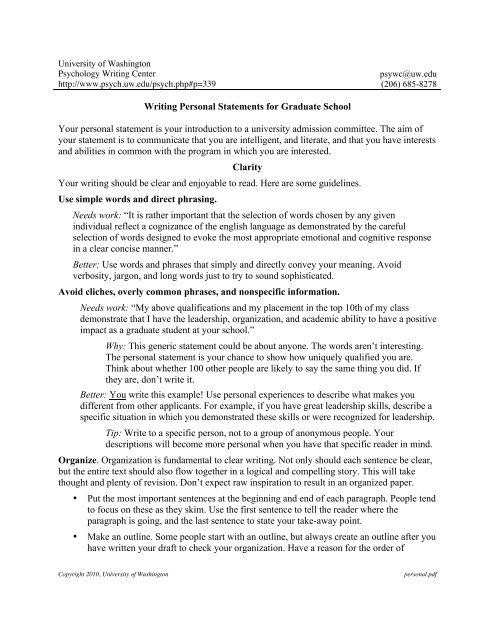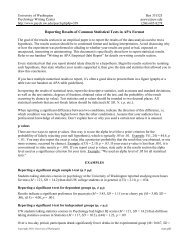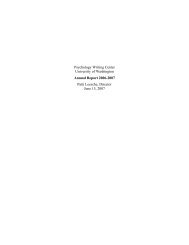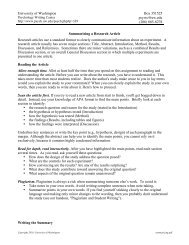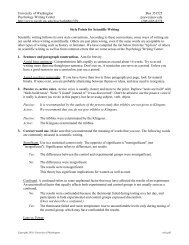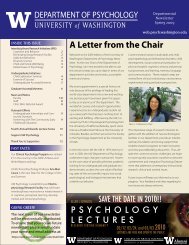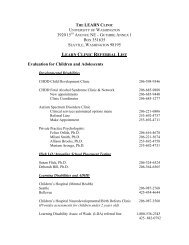Writing Personal Statements for Graduate School - University of ...
Writing Personal Statements for Graduate School - University of ...
Writing Personal Statements for Graduate School - University of ...
Create successful ePaper yourself
Turn your PDF publications into a flip-book with our unique Google optimized e-Paper software.
<strong>University</strong> <strong>of</strong> Washington<br />
Psychology <strong>Writing</strong> Center<br />
http://www.psych.uw.edu/psych.php#p=339<br />
psywc@uw.edu<br />
(206) 685-8278<br />
<strong>Writing</strong> <strong>Personal</strong> <strong>Statements</strong> <strong>for</strong> <strong>Graduate</strong> <strong>School</strong><br />
Your personal statement is your introduction to a university admission committee. The aim <strong>of</strong><br />
your statement is to communicate that you are intelligent, and literate, and that you have interests<br />
and abilities in common with the program in which you are interested.<br />
Clarity<br />
Your writing should be clear and enjoyable to read. Here are some guidelines.<br />
Use simple words and direct phrasing.<br />
Needs work: “It is rather important that the selection <strong>of</strong> words chosen by any given<br />
individual reflect a cognizance <strong>of</strong> the english language as demonstrated by the careful<br />
selection <strong>of</strong> words designed to evoke the most appropriate emotional and cognitive response<br />
in a clear concise manner.”<br />
Better: Use words and phrases that simply and directly convey your meaning. Avoid<br />
verbosity, jargon, and long words just to try to sound sophisticated.<br />
Avoid cliches, overly common phrases, and nonspecific in<strong>for</strong>mation.<br />
Needs work: “My above qualifications and my placement in the top 10th <strong>of</strong> my class<br />
demonstrate that I have the leadership, organization, and academic ability to have a positive<br />
impact as a graduate student at your school.”<br />
Why: This generic statement could be about anyone. The words aren’t interesting.<br />
The personal statement is your chance to show how uniquely qualified you are.<br />
Think about whether 100 other people are likely to say the same thing you did. If<br />
they are, don’t write it.<br />
Better: You write this example! Use personal experiences to describe what makes you<br />
different from other applicants. For example, if you have great leadership skills, describe a<br />
specific situation in which you demonstrated these skills or were recognized <strong>for</strong> leadership.<br />
Tip: Write to a specific person, not to a group <strong>of</strong> anonymous people. Your<br />
descriptions will become more personal when you have that specific reader in mind.<br />
Organize. Organization is fundamental to clear writing. Not only should each sentence be clear,<br />
but the entire text should also flow together in a logical and compelling story. This will take<br />
thought and plenty <strong>of</strong> revision. Don’t expect raw inspiration to result in an organized paper.<br />
• Put the most important sentences at the beginning and end <strong>of</strong> each paragraph. People tend<br />
to focus on these as they skim. Use the first sentence to tell the reader where the<br />
paragraph is going, and the last sentence to state your take-away point.<br />
• Make an outline. Some people start with an outline, but always create an outline after you<br />
have written your draft to check your organization. Have a reason <strong>for</strong> the order <strong>of</strong><br />
Copyright 2010, <strong>University</strong> <strong>of</strong> Washington<br />
personal.pdf
<strong>University</strong> <strong>of</strong> Washington<br />
Psychology <strong>Writing</strong> Center<br />
http://www.psych.uw.edu/psych.php#p=339<br />
psywc@uw.edu<br />
(206) 685-8278<br />
paragraphs and sentences, and have clear main points that fit together. Evaluate the worth<br />
<strong>of</strong> each point and decide whether it contributes something unique.<br />
• Use meaningful transitions between paragraphs to keep your reader engaged and reflect<br />
your organization. For example, "After my experience with X, I decided to explore other<br />
topics by joining Dr. Z's lab." This description is a stronger transition than just "In<br />
addition" or “Further”.<br />
Check spelling and grammar. Remember, you’re applying to graduate school! Use a spell<br />
checker, but also reread text to catch errors that the spell checker will miss (e.g., "affect" vs.<br />
"effect"; "its" vs. "it's"). Don’t let your writing imply that you're too lazy or don't care enough to<br />
fix typos, or worse, that you're in college and still don't know how to spell.<br />
Read and follow the essay guidelines on <strong>for</strong>matting. Make your statement fit neatly within the<br />
allotted space (usually 1-2 pages). Standard <strong>for</strong>matting is 1" margins and 12-point font size.<br />
Experiment with font styles to see which best serve your space requirements, but avoid unusual<br />
fonts, which are distracting. For other suggestions, check out the APA Manual on typeface.<br />
Creative Content<br />
Your statement must be at least substantive, and if you can be creative that's even better. Read<br />
and re-read the essay instructions <strong>for</strong> each school to which you’re applying. What and how you<br />
write will vary according to these guidelines. Here are some typical areas to include:<br />
• <strong>Personal</strong> reasons <strong>for</strong> your interest in the area (e.g., difficulties overcome, exceptional<br />
extracurricular achievements).<br />
• Clinical or related work experience. Discuss your specific roles and accomplishments,<br />
both individually and with others.<br />
• Recognition <strong>of</strong> and interest in work conducted by individuals in the department to which<br />
you are applying.<br />
These examples are pretty standard, so don't limit yourself to this list. Use your imagination!<br />
Incorporating less traditional stories can be very effective, but stay on topic: everything that you<br />
write must be directly relevant to the essay instructions.<br />
Conciseness<br />
Stay well within length requirements. The committee will have many statements to read and<br />
will welcome writing that is short, to the point, and uses well-chosen words. If you find yourself<br />
running over, evaluate which aspects <strong>of</strong> your statement are essential. Be willing to cut sections<br />
that may be nice but not special. Even if you meet the length requirement, still evaluate your<br />
writing <strong>for</strong> wordiness. You can always write shorter. Here is a short checklist:<br />
• Have you stated in<strong>for</strong>mation concisely? Is anything wordy or repetitious?<br />
• Does each paragraph and each sentence convey a specific, meaningful point?<br />
Copyright 2010, <strong>University</strong> <strong>of</strong> Washington<br />
personal.pdf
<strong>University</strong> <strong>of</strong> Washington<br />
Psychology <strong>Writing</strong> Center<br />
http://www.psych.uw.edu/psych.php#p=339<br />
psywc@uw.edu<br />
(206) 685-8278<br />
• Can you combine paragraphs that convey the same point?<br />
• Are you crowding the page by using small margins and too-small font?<br />
For a Strong Final Draft<br />
Incubate and revise. Leave enough time to set your statement aside and come back to it later<br />
with fresh eyes. If you write several or even many drafts, you’ll be pleased at how much better<br />
your final draft is compared to the first one.<br />
Ask <strong>for</strong> feedback. When you're satisfied with your draft, ask others to read it (graduate students,<br />
faculty mentors, friends, parents), and be open to their suggestions. Faculty and others who are<br />
writing recommendations <strong>for</strong> you are good people to ask <strong>for</strong> comments. Don’t be shy about<br />
sharing this writing with people you know – remember that your future faculty mentors and<br />
colleagues will read it.<br />
Pro<strong>of</strong>read every draft – especially the last one.<br />
Copyright 2010, <strong>University</strong> <strong>of</strong> Washington<br />
personal.pdf


